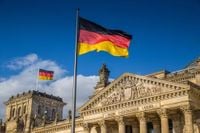In the weeks leading up to the local elections in North Rhine Westphalia, Germany’s most populous state, an unexpected and tragic sequence of events has gripped the nation’s political landscape. Six candidates from the far-right Alternative for Germany (AfD) party have died within a short period, prompting a swirl of speculation, debate, and concern that has spread far beyond the country’s borders. The local elections, scheduled for September 14, 2025, will see more than 20,000 candidates vying for office in a state with 18 million residents—a political contest of enormous scale and consequence.
According to The Independent and BBC, the deaths included four main candidates and two reserves, among them Ralph Lange (66), Wolfgang Klinger (71), Stefan Berendes (59), and Wolfgang Seitz (59). These losses occurred within just 13 days, a timeline that has drawn particular attention. The suddenness of these events has not only disrupted campaign plans but also forced electoral officials to reprint ballots and require some postal voters to recast their votes, as reported by BBC and The Economic Times.
Police and authorities have been quick to address public concerns. Statements from German police, cited by DPA and The Independent, firmly state that there is no evidence of foul play in any of the deaths. Early reports suggest that two of the cases were due to natural causes, while the specific circumstances of the others remain undisclosed out of respect for the privacy of the families involved. The state’s interior ministry further emphasized that candidates from other parties, including the Social Democrats and Greens, also died during the same period, suggesting that mortality among such a large group of candidates is not unusual.
Despite these official reassurances, the concentration of deaths within the AfD has ignited a firestorm of speculation—especially on social media. Retired economist Stefan Homburg captured the anxiety of many when he posted on X that the number of deaths among AfD candidates was “statistically almost impossible.” This claim was quickly amplified: AfD’s national co-leader Alice Weidel retweeted Homburg’s post, while billionaire entrepreneur and AfD supporter Elon Musk responded with an emphatic exclamation mark. The viral nature of these posts propelled the story into international headlines, turning what authorities describe as coincidental natural deaths into a topic of heated debate.
AfD’s co-leader in North Rhine Westphalia, Kay Gottschalk, has tried to strike a careful balance. In remarks made to Politico’s Berlin Playbook Podcast, Gottschalk said, “What I have in front of me is just partial information that doesn’t back up these suspicions at the moment.” He added that while the party wants the cases investigated, “without immediately getting into conspiracy-theory territory,” it’s important to handle the situation with respect for the grieving families. Gottschalk’s call for restraint reflects the party’s desire to address its supporters’ concerns without fueling baseless theories that could further inflame tensions.
The timing of these tragedies comes during a period of dramatic growth for the AfD. The party has surged in popularity, becoming Germany’s main opposition force after securing 20.8% of the national vote in the February 2025 general election—a meteoric rise from its humble beginnings just over a decade ago. In North Rhine Westphalia, AfD’s support has climbed from 5.4% to 16.8% since 2022, according to BBC. The party’s anti-immigration message and criticism of the traditional political establishment have resonated with a growing segment of the electorate, particularly in the east but increasingly in the west as well.
Yet, the AfD’s rise has not gone unnoticed by German authorities. In May 2025, the nation’s domestic intelligence agency classified the party as “extremist” in a sprawling 1,100-page report, a move that authorized the use of secret surveillance methods—ranging from recruiting confidential informants to intercepting communications. This heightened scrutiny has created an atmosphere of suspicion that some believe may be feeding conspiracy theories about the recent deaths, even as no evidence has emerged to suggest any connection.
For the AfD, the deaths have posed both logistical and political challenges. The need to replace deceased candidates on short notice has forced the party and election officials to scramble, with ballots being reprinted and some absentee votes invalidated. According to The Economic Times and BBC, the party has managed to continue campaigning, filling the gaps left by the deceased and pressing forward with its message in hundreds of local races across the state.
The broader political implications remain uncertain. On one hand, the tragedy could generate sympathy among AfD supporters, who might view the deaths as a sign of the adversity their movement faces. On the other, the controversy and speculation could discourage more moderate voters who are wary of associating with a party at the center of such a storm. As The European Conservative noted, initial expectations were that AfD would not pose a significant challenge in the September elections, but the unusual circumstances may yet shift the electoral calculus.
Adding another layer of complexity, the AfD has faced other forms of institutional resistance. In September 2024, Deutsche Kreditbank Aktiengesellschaft (DKB) closed the accounts of AfD politician Sascha Schlösser after his election victory, an action Schlösser publicized on social media. Meanwhile, a high-profile member of the party, Björn Höcke, was convicted for using a Nazi slogan at an event last year, and a June 2025 intelligence report found that the number of right-wing extremists within the party had risen by 77% in a single year, reaching around 20,000 people.
Despite the turbulence, the AfD remains undeterred. The party continues to campaign vigorously, with leaders like Alice Weidel and Kay Gottschalk urging both vigilance and composure. As the September 14 election approaches, all eyes are on North Rhine Westphalia—not just to see how the AfD fares at the polls, but also to watch how Germany manages the intersection of tragedy, speculation, and democracy in one of its most consequential electoral contests.
Whatever the outcome, these weeks have underscored just how quickly tragedy and rumor can shape the political narrative, especially in a climate already charged with suspicion and division.


